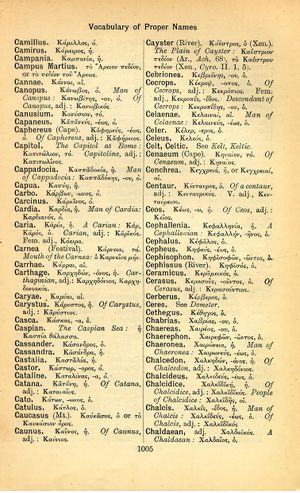Cassander: Difference between revisions
From LSJ
ἆρά γε λόγον ἔχει δυοῖν ἀρχαῖν, ὑλικῆς τε καὶ δραστικῆς → does it in fact have the function of two principles, the material and the active?
(D_2) |
(Gf-D_2) |
||
| Line 1: | Line 1: | ||
{{WoodhouseENELnames | {{WoodhouseENELnames | ||
|Text=[[File:woodhouse_1005.jpg|thumb|link= | |Text=[[File:woodhouse_1005.jpg|thumb | ||
|link={{filepath:woodhouse_1005.jpg}}]]Κάσανδρος, ὁ. | |||
}} | }} | ||
{{Lewis | {{Lewis | ||
Revision as of 07:29, 14 August 2017
English > Greek (Woodhouse)
Κάσανδρος, ὁ.
Latin > English (Lewis & Short)
Cassander: dri, m., = Κάσσανδρος.
I A son of Antipater, and king of Macedonia after the death of Alexander the Great, Just. 15, 1 sq.; Curt. 10, 10, 9; Cic. Off. 2, 14, 48; Nep. Eum. 13, 3.—After him was named the town Cassandrea, Liv. 44, 11, 2. —
II A Greek astrologer, Cic. Div. 2, 42, 88.
Latin > French (Gaffiot 2016)
Cassander,¹⁴ drī, m., Cassandre,
1 prince macédonien : Just. 12, 14, 1 ; -drus Nep. Eum. 13, 3
2 célèbre astronome : Cic. Div. 2, 88.

